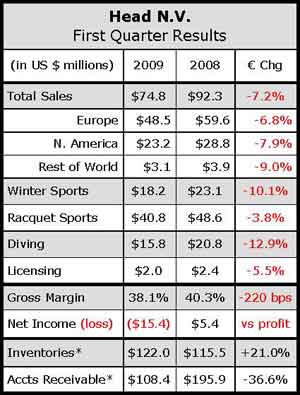Head N.V. net revenues fell in the first quarter as both the companys Diving and Winter Sports divisions felt the impact of the weaker economy with double-digit declines in sales. Even the Racquet Sports division saw a 3.8% decline in sales in the quarter, the divisions seasonally strongest period. On a constant-currency basis, total net revenues decreased 10% for the quarter and declined 7.2% to 57.2 million ($74.8 mm) when reported in euro terms. The reported operating loss deteriorated to 10.1 million ($13.2 mm) from a loss of 3.1 million ($4.1 mm) in the 2008 first quarter.

Winter Sports segment bookings are currently running 9% behind last years and the company expects them to end below last years level. The segments revenues for the quarter decreased 10.1% to 13.9 million ($18.2 mm) from 15.4 million ($23.1 mm) in the year-ago quarter, mainly due to lower sales volumes of skis and ski boots compared to sales for the first quarter last year. That decline was partially offset by higher sales volumes for bindings and protection wear (helmets).
Units of skis sold in the first quarter of 2009 declined 17% from the comparable period last year to 48,300 pairs, and boots sold during the quarter dropped 24% from last period to 38,000 pairs.
HEAD said the 2008/2009 winter season began with very good snow conditions in Europe and some parts of the U.S., but with late snow in Japan. Retailers in Europe saw a growing winter sports equipment business mainly driven by helmets and ski boots. However, ski sales in Europe for the period ended December 31, 2008 were flat compared to 2007.
“Whilst we have yet to complete our winter season bookings,” said HEAD Chairman and CEO Johan Eliasch, “Our bookings suggest that sales will be below last years levels. In Winter Sports our bookings are currently running 9% behind and in our diving division they are 20% behind. Racquet sports bookings are broadly in line with prior years.”
The company said that the ongoing trend towards ski rentals is responsible for the increased demand for boots compared to skis. HEAD anticipates declining pre-season orders for 2009, especially for skis and bindings.
Racquet Sports revenues for the quarter decreased 3.8% to 31.2 million ($40.8 million) from 32.4 million ($42.4 million) in the comparable 2008 period. Racquet units sold were down nearly 23% to 404,000 units. Some of the decline in racquet sales was offset by a small increase in the units of balls sold (+2.8%) and the strengthening of the U.S. dollar against the euro.
The company estimates that the market for tennis racquets in 2008 was around 9.8 million units, with a value of approximately 280 million at wholesale level. HEAD stated that the global tennis racquet market was stable in unit sales in 2008 but declined by approximately 7% in euro value compared to 2007. Fluctuations of currencies had a major impact in the decline of the market.
Head estimates that worldwide sales of tennis balls were approximately 180 million ($235.4 million) at the wholesale level in 2008, with approximately 24 million dozen tennis balls sold, and estimates that growth was flat in units but declined in value compared to 2007. The Racquet Sports category is the only Head N.V. segment currently showing bookings roughly in line with prior years, as Winter Sports and Diving drag behind.
Diving revenues fell 12.9% to 12.1 million ($15.8 mm) for the first quarter as worldwide diving markets continued to decline in the range of 20% compared to the same period in 2008. The company commented that the diving industry is one of the sporting goods business most affected by the worldwide financial crisis. Head N.V. said it does not expect a recovery during fiscal year 2009. Diving division bookings for the full year are currently 20% behind, suggesting they will end the year below last years levels.
Licensing revenues decreased 5.5% to 1.5 million ($2.0 million) due to fewer licensing agreements.
The company reported that during the quarter, gross margins decreased to 38.1% of net sales from 40.3% in the comparable 2008 period due to unfavorable product mix.
The expected decline in sales, together with a lower cash balance, combined with the cash costs of interest expense and capital expenditures, will result in HEAD having to manage working capital more aggressively. If they are unsuccessful in this, management said they could be required to generate additional cash or secure additional credit facilities.













